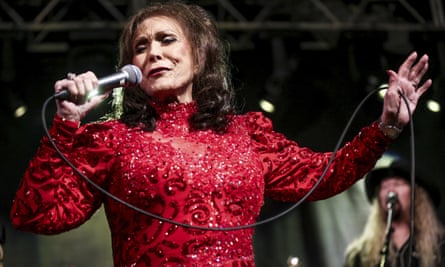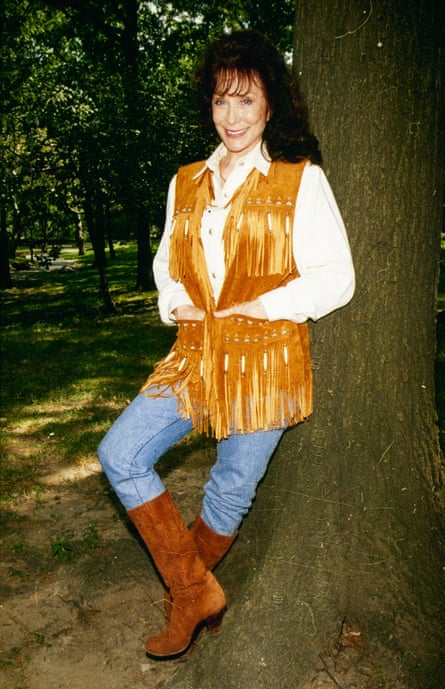Country music has sometimes been described as the authentic blue collar voice of the American south. In the past half-century no singer and songwriter did more to justify that claim than Loretta Lynn, who has died aged 90. In the words of the music historian Bill Malone, Lynn’s songs “spoke for working-class women in a way no ardent feminist could ever do”.
The self-penned Success (1962) was her first Top 10 country hit and was followed by a slew of No 1 singles on the US country chart, including, in 1966, Don’t Come Home a Drinkin’ (With Lovin’ On Your Mind), an assertive song that cemented her reputation as the defiant voice of the ordinary woman.
The inspiration for some of Lynn’s compositions was her volatile relationship with her husband, Oliver Lynn, whose nickname was Mooney, a reference to his involvement with moonshine, or illegal liquor. But sometimes her songs were addressed to the “other woman”, for instance, You Ain’t Woman Enough (To Take My Man) from 1966.
Her other hits dealt with such topics as the human cost of the Vietnam war (Dear Uncle Sam in 1966 – a song she revived during the Iraq war); motherhood (One’s on the Way, composed by the humorist Shel Silverstein, in 1971); divorce (Rated X, from 1973); and contraception (The Pill, which was banned by numerous radio stations when it was released in 1975).
The most clearly autobiographical of her hit songs was Coal Miner’s Daughter, a No 1 hit in the country chart in 1970, and one of her few records to make the mainstream US chart. Lynn said the song “told everybody that I could write about something else besides marriage problems”, and it was chosen as the name for her 1976 autobiography, as well as the 1980 film of her rags-to-riches life, which brought her story to an international audience.
She was born in the poverty-stricken mining town of Butcher Hollow in the Appalachian mountains of Kentucky, the second of eight children of Ted Webb, a coalminer. Her mother, Clara (nee Butcher), who was of part-Cherokee ancestry, named her daughter after a favourite film star, Loretta Young. Loretta was encouraged to sing at family gatherings and in church during her childhood. Two of her sisters (including Brenda Gail, who achieved success under the name Crystal Gayle) and a brother, Willie “Jay” Lee, also became professional musicians.
In 1948, three months before her 16th birthday, Loretta married Mooney. After he lost his mining job, the couple moved to the logging town of Custer, in Washington state. Mooney worked as a garage mechanic and farmhand while Lynn combined raising a family with singing and playing guitar with her own band. She gave birth to four of her six children before the age of 19.
In 1960 she made a record of her own song, I’m a Honky Tonk Girl, for a local label, Zero. Although it was not a hit, it attracted the attention of the established country entertainers the Wilburn Brothers, who arranged for Lynn to appear on the Grand Ole Opry radio show in Nashville, the centre of the country music industry.
Lynn soon landed a recording contract with the veteran producer Owen Bradley, who had masterminded the careers of Kitty Wells and Patsy Cline, both of whom had inspired Lynn. Bradley said that “Kitty was the mistreated housewife, and Loretta was the housewife who wasn’t gonna take anything off of anybody.” Lynn became friends with Cline, who died in a plane crash in 1963; she paid tribute to her with a 1977 album of Cline’s songs, including a popular version of She’s Got You.
In addition to her hit records, Lynn’s stardom was based on incessant touring with her own band. She believed that “if you’re gonna record, you gotta be out there with the people who buy your records”. She regularly played about 125 shows a year, travelling 150,000 miles annually in her customised tour bus. In the late 1960s her backing singers included her sisters Peggy Sue and Brenda Gail, whose first hit as Crystal Gayle – I’ve Cried (The Blue Right Out of My Eyes) – was composed by Lynn.
In 1969 Lynn was booked to play the first international festival of country music to be held at Wembley Stadium in London. She and the veteran country star Conway Twitty performed a few songs together and the response was good enough to persuade them to record a series of duets, several of which became hits. The most original was the chart-topping As Soon As I Hang Up the Phone, which was styled as a telephone call from Conway to Lynn. In 1972 the duo won a Grammy award for their recording After the Fire Is Gone.
Lynn’s autobiography, co-written with the journalist George Vecsey, was a graphic evocation of her Appalachian childhood, and headed the New York Times bestseller list for nine weeks. Greater fame followed when the book was filmed with Sissy Spacek as Lynn and Tommy Lee Jones as Mooney. Spacek’s performance won her an Oscar for best actress in 1981.
Lynn began to release fewer recordings in the 80s and the early 90s, as she spent time nursing Mooney, who died in 1996 after suffering from diabetes. In 1993 she made Honky Tonk Angels, a landmark album with the other grande dames of country, Dolly Parton and Tammy Wynette. Like Parton, Lynn was an astute businesswoman. She owned large amounts of real estate in the town of Hurricane Mills, Tennessee, where she operated a ranch that includes a replica of the Butcher Hollow cabin she grew up in.

Lynn published a second volume of autobiography, Still Woman Enough, in 2002 and a cookery book – You’re Cookin’ It Country – two years later. There were occasional albums in later years, including Van Lear Rose (2004), produced by Jack White of the White Stripes, and the Grammy-nominated Full Circle (2016), which included duets with Willie Nelson and Elvis Costello. Her final studio album, also called Still Woman Enough, was released in 2021. She continued touring despite health problems that included knee surgery and hospital treatment for pneumonia.
Lynn had more awards from the annual Country Music Association ceremonies than any other female singer, and was elected to the Country Music Hall of Fame in 1988. In 2013 she was awarded the Presidential Medal of Honor by Barack Obama.
She is survived by her children Cissy, Ernest, Peggy and Patsy, and more than 20 grandchildren. Her son Jack died in 1984 and her daughter Betty Sue in 2013.
Loretta Lynn, singer and songwriter, born 14 April 1932; died 4 October 2022

